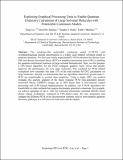| dc.contributor.author | Liu, Fang | |
| dc.contributor.author | Sanchez, David M. | |
| dc.contributor.author | Kulik, Heather Janine | |
| dc.contributor.author | Martínez, Todd J. | |
| dc.date.accessioned | 2020-02-19T20:06:18Z | |
| dc.date.available | 2020-02-19T20:06:18Z | |
| dc.date.issued | 2018-10 | |
| dc.date.submitted | 2018-06 | |
| dc.identifier.issn | 0020-7608 | |
| dc.identifier.uri | https://hdl.handle.net/1721.1/123830 | |
| dc.description.abstract | The conductor‐like polarizable continuum model (C‐PCM) with switching/Gaussian smooth discretization is a widely used implicit solvation model in quantum chemistry. We have previously implemented C‐PCM solvation for Hartree‐Fock (HF) and density functional theory (DFT) on graphical processing units (GPUs), enabling the quantum mechanical treatment of large solvated biomolecules. Here, we first propose a GPU‐based algorithm for the PCM conjugate gradient linear solver that greatly improves the performance for very large molecules. The overhead for PCM‐related evaluations now consumes less than 15% of the total runtime for DFT calculations on large molecules. Second, we demonstrate that our algorithms tailored for ground state C‐PCM are transferable to excited state properties. Using a single GPU, our method evaluates the analytic gradient of the linear response PCM time‐dependent density functional theory energy up to 80× faster than a conventional central processing unit (CPU)‐based implementation. In addition, our C‐PCM algorithms are transferable to other methods that require electrostatic potential (ESP) evaluations. For example, we achieve speed‐ups of up to 130× for restricted ESP‐based atomic charge evaluations, when compared to CPU‐based codes. We also summarize and compare the different PCM cavity discretization schemes used in some popular quantum chemistry packages as a reference for both users and developers. | en_US |
| dc.description.sponsorship | United States. Department of Energy (Grant DE‐SC0018906 SciDAC) | en_US |
| dc.description.sponsorship | National Science Foundation (Grant ACI‐1429830) | en_US |
| dc.description.sponsorship | National Science Foundation (Grant ACI‐1548562) | en_US |
| dc.publisher | Wiley | en_US |
| dc.relation.isversionof | http://dx.doi.org/10.1002/qua.25760 | en_US |
| dc.rights | Creative Commons Attribution-Noncommercial-Share Alike | en_US |
| dc.rights.uri | http://creativecommons.org/licenses/by-nc-sa/4.0/ | en_US |
| dc.source | Prof. Kulik | en_US |
| dc.title | Exploiting graphical processing units to enable quantum chemistry calculation of large solvated molecules with conductor-like polarizable continuum models | en_US |
| dc.type | Article | en_US |
| dc.identifier.citation | Liu, Fang et al. "Exploiting graphical processing units to enable quantum chemistry calculation of large solvated molecules with conductor‐like polarizable continuum models." International Journal of Quantum Chemistry 119, 1 (January 2019): e25760 © 2018 Wiley | en_US |
| dc.contributor.department | Massachusetts Institute of Technology. Department of Chemical Engineering | en_US |
| dc.relation.journal | International Journal of Quantum Chemistry | en_US |
| dc.eprint.version | Author's final manuscript | en_US |
| dc.type.uri | http://purl.org/eprint/type/JournalArticle | en_US |
| eprint.status | http://purl.org/eprint/status/PeerReviewed | en_US |
| dspace.date.submission | 2020-02-13T02:16:38Z | |
| mit.journal.volume | 119 | en_US |
| mit.journal.issue | 1 | en_US |
| mit.license | OPEN_ACCESS_POLICY | |
| mit.metadata.status | Complete | |
